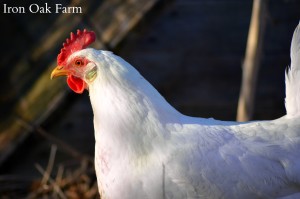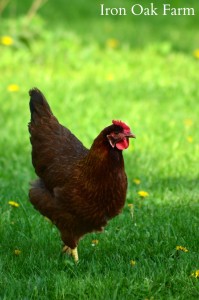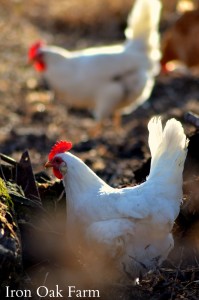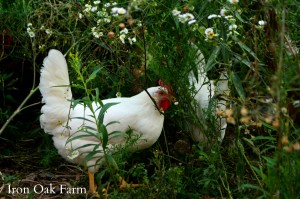 *Warning* this post discusses some disgusting yet important information for keeping a flock of healthy chickens.
*Warning* this post discusses some disgusting yet important information for keeping a flock of healthy chickens.
Clean drinking water is probably the single most important thing you can do to keep your flock healthy. In this post I’d like to discuss the correlation between clean drinking water and a condition called Pasty Vent, which if left untreated can result in the dangerous and disgusting Fly Strike.
Pasty Vent is the build up of fecal matter around the vent or rear end of a chicken. This build up is not only unsightly, as the feathers become matted with droppings, but can cause other problems as well including dirty eggshells, dirty nest boxes, internal bacterial infections and Fly Strike.
Fly Strike is a disgusting condition where flies lay their eggs in the feces around the vent and when the maggots hatch, they consume the droppings and/or diseased flesh of the area. Fly Strike can also occur on wounds that are not properly treated. The maggots can move internal and cause many problems both painful and deadly to a chicken.
 Pasty vent is usually caused from bacteria build up in the drinking water. Many times this bacteria growth is harbored in unclean watering dispensers.
Pasty vent is usually caused from bacteria build up in the drinking water. Many times this bacteria growth is harbored in unclean watering dispensers.
Providing a constant source of clean drinking water to the flock is a chicken keeper’s nemesis. If given the chance, chickens will fly, flap, scratch and roost in or around their water dispenser. This causes debris and droppings to pollute the water very quickly in the coop.
If you feel frustrated with the endeavor to provide clean drinking water to your chickens, you’re not alone. There are hundreds of products on the market trying to solve this dilemma for chicken keepers. Nipple waterers, vacuumed waterers even additives to mix with the water to keep bacteria levels low.
 After keeping chickens for 20+ years, the best advice I can give is to buy a waterer that you will keep clean. And this might be different for each of us.
After keeping chickens for 20+ years, the best advice I can give is to buy a waterer that you will keep clean. And this might be different for each of us.
Giving chickens water that “looks” clean isn’t enough. Waterers need to be disinfected regularly. We’ve tried many different watering products over the years. Vacuum systems, nipple type, and combinations of the two and we always go back to the simple rubber pail.
In our experience, the “fancy” type waterers give us a false sense of security. I see that the chickens have water in these devices, it looks clean enough and so I leave it be. I also find that while these devices are easy to fill and keep a source of water longer for the chickens, they are difficult to empty, they store water for too long (in my opinion) allowing it to become warm in the summer heat and create a perfect environment for bacteria and algae growth. They also have multiple parts that need disinfecting.
 Now, this is just my opinion and my experience.
Now, this is just my opinion and my experience.
If you prefer these types of wateres and you’re diligent about sanitizing them then by all means continue to do so. Each of us has a different routine with our flock and you have to keep what works for you. Adding things like apple cider vinegar to the water can keep down bacteria in waterers like these. (So long as they’re not galvanized)
For our flock I find that several low rubber dishes work great. They are easy to empty, rinse out and fill again. I can also wash them down with a bit of bleach and a scrubby sponge without having to unscrew or disassemble anything.
 An easy waterer means a clean waterer and happy, healthy chickens.
An easy waterer means a clean waterer and happy, healthy chickens.
Treatment and Additional Prevention of Pasty Vent and Fly Strike
If you suspect that your chickens have Pasty Vent, begin by being diligent about clean water. Wash and disinfect the waterer everyday.
Keep the coop clean to discourage flies.
Hang fly strips if it’s a bad year for insects.
Mix up a batch of Fly Spray from our writers here at Community Chickens.
Inspect the vent everyday for maggots.
Clean the vent as best you can. For more on this, see my post Chicken Bath 101.
If maggots are present, apply a thick layer of Vaseline to the area. This will suffocate the maggots and help protect and heal the irritated skin.
For further assistance contact your veterinarian.
How do you keep your chickens water clean? Share your tips by leaving a comment below, or visit the Community Chickens Facebook Page.













6 Comments
A person’s success does not depend on his wisdom, but perseverance
I agree with Lisa. Unclean water is not the source of pasty vent. Pasty vent in chicks is usually caused by too much heat. I would look for sources for pasty vent in unhealthy gut bacteria, treated with probiotics. In adult chickens I believe it is caused by diarrhea which can be caused by a whole host of ailments. Chickens guts are very well suited to deal with common bacteria in the coop, my chickens prefer to drink from muddy pools in stead of the sparkling clean water I provide. They never get sick, and I am sure they ingest their share of bacteria by doing that.
Also applying vasiline to “suffocate maggots” is not recommended. Everything I have read on flystrike is not to apply ointment, including vasiline. But spray with saline water or vetericine, Pick out hatched maggots with a tweezers and keep cleaning the wound until healing occurs.
I disagree with your analysis that pasty butt is caused by bacteria in the drinking water. I believe you are giving false information. However, I will give you a chance to provide your source of this information and “teach” me.
I try hard to keep my girls water containers as clean as possible but I must admit that I have never disinfected them. How do I do this safely?
I’ve found that cheap, low quality feed also causes pasty vent. Feeding good, organic grains, and sources of clean protein, keeps my flock of 34 happy and healthy. The only problems I have are out-of-season broodiiness. But I’m with mine 24/7, so I can catch problems quick.
I have had chickens for seven years, at first I was all gung ho about getting all the fancy water containers, and feeding dishes, etc. Now, I use a sterling silver pasta pan, I have a leaky hose that circulates the water 24/7, and I pour it out every day, for maintenance I add vinegar once a month during the cooler months, and every other week in hot weather, I scrub out the pan about every couple weeks. My chickens are doing fine, I only get sticky vent when I have a broody girl that won’t leave the nest, so I chase them out of the nest when that happens, clean out the hay, and they recover in a few days. Mine are free roaming, and can get into bad sources of water on rainy days, but I try to keep on top of checking them out daily, so no issues. With chickens you never know what they will get into though.